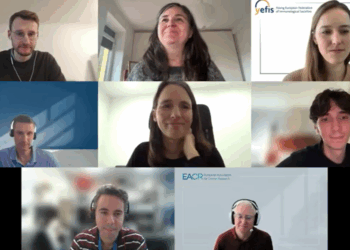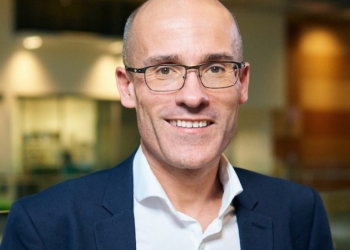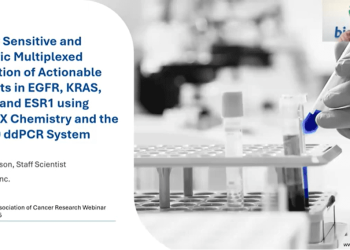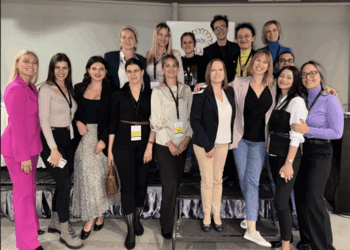 Dr. Alexandra Boitor, EACR Scientific Officer, gives a few of the highlights from the virtual EACR Early Career Researchers’ Conference (24-25 June 2025).
Dr. Alexandra Boitor, EACR Scientific Officer, gives a few of the highlights from the virtual EACR Early Career Researchers’ Conference (24-25 June 2025).
The EACR Early Career Researchers’ Conference is a virtual event that takes place annually in June. Aiming to cover the burning questions of young scientists, this event provides a unique opportunity for early-career researchers to learn about different careers in cancer research and develop soft skills.
This virtual conference is designed for early-career scientists who aspire to build a future in cancer research. The programme specifically supports those transitioning from their PhD or postdoctoral work, offering guidance and insight into the diverse career paths available—both within academia and beyond. In its fifth edition, this virtual conference has become a must-attend for early-career researchers to discuss critical aspects of a scientific career in cancer research.
Topics covered in this edition looked at career development from conversations around different career paths available to PhDs (including academia, industry and scientific publishing) to developing skills such as leadership and communication skills – with an emphasis on the use of social media.
Ultan McDermott, medical oncologist and Chief Scientist at AstraZeneca (UK), gave a talk on ‘Transitions in life: from academia to industry’. In his presentation, Ultan highlighted the diverse career options available in the industry and presented some pros and cons of working in academia versus industry. Ultan also noted a few factors to take into account when you’re at a fork in the road in your career and a few aspects to consider when starting to plan your transition. Throughout his presentation, Ultan emphasised the importance of mentorship and a professional (and personal) network. If you’re interested in transitioning to industry, you can learn more by listening to Ultan’s talk shared in the EACR member area.
A conversation around leadership took place in the context of becoming a good group leader and mentor, particularly in academia. Laura Escudero and Sankari Nagarajan, member and former member of the EACR Early-Career Researchers Council, spoke on this topic, sharing their personal experiences. Being at different career levels, Laura is a postdoctoral researcher at McMaster University, Canada, and Sankari is a PI and lecturer at the University of Manchester, UK, they approached the topic from different perspectives, focusing on a different range of challenges.
Sharing her career progression so far and the journey she is on, preparing to become a PI herself, Laura emphasised the importance of choosing a research topic and a place to study/ work that suits you (aka staying put or moving abroad). If you are an EACR member, you can find out more about Laura’s journey, the reflection tools, tips and tricks she uses and her opinion on the secret ingredients for success by listening to her talk shared in the EACR member area.
From the perspective of an already established PI, Sankari presented her personal career progression story with some reflections on what, looking back, she thinks she could have done better. Sankari’s talk had a focus on balancing work with family life, and in addition to sharing some tips on balancing the challenges and benefits of a career in academia, Sankari shared some concrete advice on preparing for fellowship applications.
Although Laura and Sankari’s talks looked at leadership in academia from two fairly different perspectives, both of them highlighted the importance of mentorship in this process, noting that a good mentor would support you through making the right decision for you, taking into account both your professional and personal goals.
Mental well-being was also on the radar as invited speaker Joan Chang discussed ‘The one constant in research – “failure” and how to support people (and yourself) through them’. If you’d like to hear more on this topic, Joan’s talk is available to watch here or on our YouTube channel.
Other topics discussed during the conference include the importance of open science and patient engagement in translational research. The programme was complemented by two open forums, one at the end of each day, to facilitate discussion and interactions between participants and invited speakers.
The EACR Early Career Researchers’ Conference provided a safe space for early-career researchers to reflect, grow, and connect around the essential skills that drive long-term career success. From learning more about communication and leadership to navigating career transitions with confidence, each session offered actionable insights and inspiration. As we return to our day-to-day roles, let’s carry forward the tools, connections, and motivation gained here to inspire our own career journeys.



 Dr. Alexandra Boitor, EACR Scientific Officer, gives a few of the highlights from the virtual EACR Early Career Researchers’ Conference (24-25 June 2025).
Dr. Alexandra Boitor, EACR Scientific Officer, gives a few of the highlights from the virtual EACR Early Career Researchers’ Conference (24-25 June 2025).




